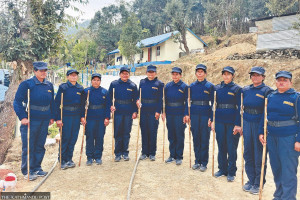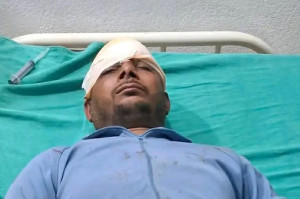Sudurpaschim Province
In far-west villages, development projects are aplenty but not enough people to benefit from them
Locals say there are nepotism and political favouritism in handing over development projects.DR Panta
Nineteen out of the total 30 houses at Bishalpur Village in Mailauli Municipality, Baitadi, sit empty. Most of the villagers have migrated out of Bishalpur, but development projects keep coming to the village. Last year, various development projects, including roads, drinking water and most notably, an irrigation project of over 20 million, got completed. However, the very arable lands that would have benefited from the irrigation project are barren.
“The whole village is empty,” said Ratan Bahadur Bista, chief of Ward No. 4, addressing a recent public hearing programme that saw a mere seven attendees. “Those who would have benefited from the projects are all abroad.”
According to Bista, the ward saw the completion of 152 projects this year. In the past two years, projects worth Rs 120 million have been completed in the ward. But the people who would benefit from those projects are all away.
But it’s the reality of not just Melauli but of many villages in the hilly districts of the mid-western region. Development projects are abundant, but local units are compelled to hire labourers from other districts to complete them. On average, one ward receives over a hundred development projects each year.
“If only the development of the villages was directly proportional to the number of projects, we would have already seen some semblance of it,” said Khem Upadhyay, a researcher from the Rural Development and Research Centre. “But the reality is different. There are plenty of projects, either completed or ongoing, for which local units have disbursed enough budget, but the signs of development are not to be seen.”
Upadhyay added that while the large-scale projects have completed, nobody knows the state of small-scale projects owing to the lack of a regulating body. “A few individuals have been sharing the budget,” he said. “Even people who have migrated years ago have been counted as potential consumers of the projects. There are over two dozen such examples.”
Lakshmi Aidi, an assistant engineer at an NGO, also points to probable financial embezzlement.
“There is no regulator who keeps track of the projects’ progress,” said Aidi. “In such a situation, it is natural that there are financial frauds. Funds for the projects are disbursed mostly at the end of the fiscal year, with a simple recommendation from the ward.”
All three tiers of government have been carrying out big projects to construct motorable roads in Bishalpur Village. There is an equal investment in education, agriculture and construction sectors.
“While the number of migrants is increasing, there are no hints of development,” Aidi added.
There are several plans and policies introduced by all tiers of government, but their proper execution is lacking, said Prem Bahadur Mahar, the executive director of Multipurpose Development Society that works in the health and economy sector of the far-western districts. “The reason behind the empty village is not just economical,” he said. “The living standard has improved, but the number of out-migrants is also increasing. What is lacking is the execution of the budget on the right projects that would benefit the residents.”
The budget is spent mostly on agriculture, road construction, drinking water and self-employment. However, the people’s lifestyle has seen no significant change, said Mahar.
“We expected the villages to be lively with the election of local units, but the villages are empty, except on festivals,” Mahar said. “Nothing has changed.”
RD Joshi, a teacher at Asigram Secondary in Dadeldhura, said that the extent of ‘class difference’ is getting deeper in his district. “There is a trend among some people to misuse the development budget and invest it in accruing private properties in the Tarai,” Joshi said. “This has only made the class division more pronounced. Rich people are getting richer, and the poor, poorer.”
Aidi said that of all, only five percent of the total budget is spent wisely, and that nepotism and political favouritism is widespread on project allocations.
“Many migrants had planned to return to the village after the election of local units,” Aidi said. “If only the projects are executed wisely, that day will come when the villages would be lively and prosperous again.”




 14.24°C Kathmandu
14.24°C Kathmandu















